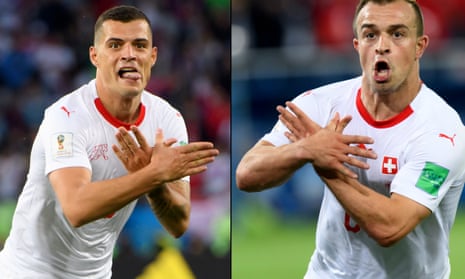“Fifa shame” read the headline in one Serbian tabloid this week. “Fifa humiliates us” cried another. It is fair to say there has been some consternation in Serbia, after the news that Xherdan Shaqiri and Granit Xhaka will be allowed to play in Switzerland’s final group game against Costa Rica.
After the pair, with Kosovar‑Albanian roots, celebrated their goals in the win against Serbia on Friday by making an eagle shape with their hands, controversy ensued and recriminations and suspensions were expected.
The gesture is associated with Albanian nationalists, so given the dim view usually taken about such things it was a mild surprise when Fifa opted only to fine the pair. Shaqiri’s and Xhaka’s pockets are lighter by 10,000 Swiss francs (about £7,600) each, while Stephan Lichtsteiner must stump up 5,000 francs for joining in with their celebrations.
The irritation comes not only because the two players, perceived to be provoking their opponents, received a slap on the wrist but because the Serbian Football Association was fined 54,000 francs for banners held up among their fans. Given that some fans wore jumpers depicting the convicted war criminal Ratko Mladic, they might not have an especially steady leg to stand on.
“I can’t discuss the gesture, I am afraid,” Shaqiri said after the game. “We are footballers, not politicians.” Which is pretty disingenuous, at best: neither man made the gesture because they think eagles are cool; nor was it a coincidence that they did so against Serbia. They made their point, which is fair enough, but to later claim they were not being political does insult the intelligence rather.
It was even more difficult to deny a political element when the Albanian prime minister, Edi Rama, launched a fund called “Don’t Be Afraid Of The Eagle”, designed to help pay Xhaka’s and Shaqiri’s fines. “The eagle sign like a high-five or a thumbs-up is one of celebration among Albanians, a.k.a. from the Land of Eagles!” Rama wrote on Facebook. “Whether a singer like @RitaOra or footballer like @XS_11official it’s a call for joy, not conflict.” Within a day, $19,000 had been raised for the two Premier League footballers.“We talked about it, the next day,” said Switzerland’s vice-captain, Valon Behrami, when asked what impact the then potential suspensions had on the squad. “We were joking around a little bit. Of course, we are happy nobody was suspended but it’s not really appropriate to talk about it now, because we have to think about playing football. It won’t happen in the future, because there won’t be another game like this [against Serbia]. Maybe it will happen with their clubs, but not in the World Cup.”
As far as Switzerland are concerned, the pair’s availability for the Costa Rica encounter on Wednesday is the most important thing. They know a win would guarantee qualification but equally that they could lose and go through, assuming Serbia are beaten by Brazil. If Switzerland lose and Serbia draw, they will be level on four points and it starts to get complicated.
Whatever complex permutations ensue, Xhaka and Shaqiri are Switzerland’s key men. It is often said that the mystery has gone out of the World Cup; the fact that we see all of these players every week meaning we know all about them. It used to be that players we watched do well every four years would then disappear, and we would have only that memory of them.
If Shaqiri were playing in those days we would have little choice but to think of him as one of the world’s great talents. He got a hat-trick in the 2014 World Cup, scored that phenomenal overhead kick against Poland at Euro 2016, and against Serbia produced a matchwinner of delicious delicacy.
The problem is, he has spent the years between tournaments underperforming, not really making it at Bayern Munich or Internazionale, then getting relegated with Stoke. Perhaps it is because the national team are more suited to him: the coach, Vladimir Petkovic, said that they had created a team of “organised chaos”, with Shaqiri at the centre of it.
The plan is for that chaos to be confined to Shaqiri wandering around the pitch, rather than anything likely to attract the attention of the authorities. “Let us focus on football for the remainder of the tournament,” said Petkovic. For Serbia, that plea might be optimistic.
